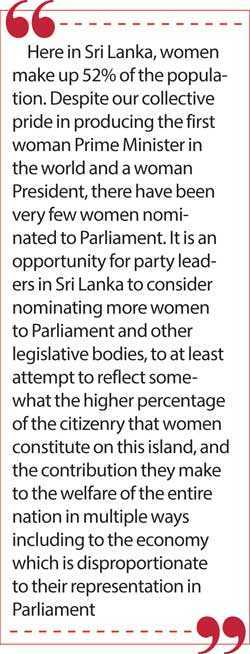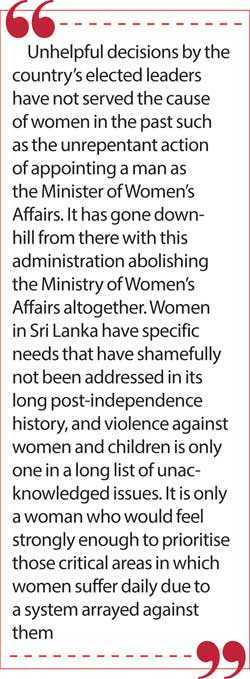Monday Feb 23, 2026
Monday Feb 23, 2026
Tuesday, 10 November 2020 00:04 - - {{hitsCtrl.values.hits}}
|
Kamala Harris
|
A glass ceiling shattered in the United States of America just after 8:30 p.m. on 7 November, as Kamala Harris, Vice President-elect walked on stage in Wilmington, Delaware to thunderous applause to deliver her acceptance speech, just ahead of her boss, President-elect of the USA, Joe Biden.
The sound of that shattering glass will reverberate across the world as it begins to experience the multidimensional consequences of a woman in power in the second highest office in the most powerful country on earth.
Here in South Asia, we have seen powerful women Prime Ministers such as Indira Gandhi and Benazir Bhutto. In Sri Lanka, which produced the first woman head of government in the world, Sirimavo Bandaranaike, we also voted for a woman President, Chandrika Kumaratunga twice, her daughter.
What’s new in the current moment for South Asia at least, is that all these powerful women leaders came from privileged families, with fathers or husbands having been heads of state. It was no cake walk for them to overcome the thick encrustation of prejudice against women in our part of the world, but a long familiarity with semi-feudalism in each of their societies eased the otherwise arduous journey just a little. People were more willing to accept their leadership, partly in deference to the predecessor who was their immediate family. 
Kamala Harris did not come from such a family. Her mother was a scientist and an activist who had travelled to America from India for higher studies, met and married a man from Jamaica who studied with her at the same university. She was a product of two educated parents, immigrants from different parts of the world, growing up in a land which teaches the right of every person to pursue their dreams and enshrines that right in the Constitution.
She had a dream, perhaps like many other women before her in the USA. Such a dream became possible when former Vice President Joe Biden picked Kamala Harris, the first woman and the first coloured person to run for that office as his Vice Presidential nominee.
In her victory speech, Kamala Harris not only mentioned her mother, Dr. Shyamala Gopalan who hails from Chennai, India, who she said was always in her heart, but also appreciated the groundbreaking and courageous decision by President-elect Biden, which may yet change the course of history. She called it a testament to his character, his “audacity”, in what could be a nod in the direction of Barack Obama who broke another barrier to become the first coloured President of the United States a few years earlier, and authored ‘The Audacity of Hope’.
It will undoubtedly have an electrifying effect on all young women who may now aspire to lead their countries, whichever point they started from. This is the irreversible consequence of that momentous decision by a healer President-elect, determined to unite rather than divide, and to make his administration reflect the true colours of the United States.
 |
 |
The Democratic Party already has several impressive young Congresswomen, some of them already political celebrities in their first term, such as Alexandria Ocasio-Cortez (‘AOC’). Their performance in Congressional committees has been outstanding in courage, clarity and confidence. It’s a new dawn for the United States, and the world will hear more from them when the new administration takes over on 20 January 2021.
Here in Sri Lanka, women make up 52% of the population. Despite our collective pride in producing the first woman Prime Minister in the world and a woman President, there have been very few women nominated to Parliament.
It is an opportunity for party leaders in Sri Lanka to consider nominating more women to Parliament and other legislative bodies, to at least attempt to reflect somewhat the higher percentage of the citizenry that women constitute on this island, and the contribution they make to the welfare of the entire nation in multiple ways including to the economy which is disproportionate to their representation in Parliament.
Unfortunately in Sri Lanka, this anomaly of contribution versus political representation is also a cultural construct which is internalised by women themselves and is evidently deeply ingrained in our society.
In the first-ever investigation into violence against women in Sri Lanka conducted by the Department of Census and Statistics using the WHO methodology described as the Women’s Wellbeing Survey (WWS) covering all 25 districts between March and September 2019, “…almost half of women interviewed agreed with the statement that ‘a man should show he is the boss’ (47.5%) and almost half agree that ‘a good wife obeys her husband even if she disagrees (46.5%).” Here’s where any attempt to promote more women in political life skids to a halt, for a start. Unhelpful decisions by the country’s elected leaders have not served the cause of women in the past such as the unrepentant action of appointing a man as the Minister of Women’s Affairs. It has gone downhill from there with this administration abolishing the Ministry of Women’s Affairs altogether.
Women in Sri Lanka have specific needs that have shamefully not been addressed in its long post-independence history, and violence against women and children is only one in a long list of unacknowledged issues. It is only a woman who would feel strongly enough to prioritise those critical areas in which women suffer daily due to a system arrayed against them.
The 2019 Women Wellbeing Survey in its executive summary states an obvious truth: “Global evidence highlights when women have the freedom to make their own choices and decisions they are able to contribute more effectively to a countries development process.”
For the average Sri Lankan woman, making her own choice is challenged in numerous ways by the cultural, political and systemic impediments that are insistently placed in her way, and ignorance is way ahead of all others.
Perhaps the definitive sound of shattering glass across the Atlantic may wake us up to new possibilities here in Indo-Pacific region, and inspire us to have the audacity to follow suit.